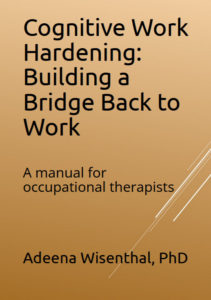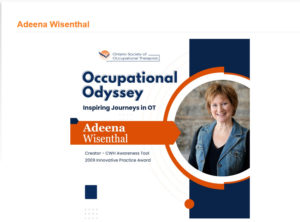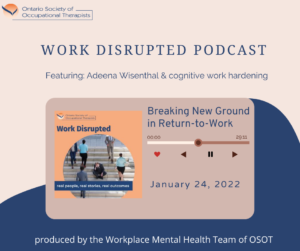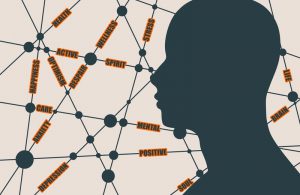A person who has been off work on disability due to depression is medically cleared to return to work. This determination is typically made by a doctor based on clinical improvement of the person’s depression symptoms. However, the person is often not ‘occupationally’ ready to resume work. This is because occupational functioning often lags behind depression symptom improvement and can be manifested in reduced concentration, mental fatigue, lack of routine, and low self-confidence.
There is usually a gap between being on disability and functioning at home and being at work and meeting job demands and interpersonal challenges. Cognitive work hardening (CWH) narrows this gap by addressing the unique occupational challenges people face following an episode of depression.
CWH is a treatment intervention that insurers rely upon to help their plan members prepare for return to work following a mental health related disability or other medical condition (e.g., post-concussion, cancer) with similar occupational sequelae. CWH restores work functioning by (i) re-establishing a work routine; (ii) rebuilding cognitive abilities; (iii) increasing work stamina; (iv) improving self-confidence; and (v) contributing to enhanced feelings of efficacy.
CWH is the missing link in mental health and return-to-work rehabilitation which typically consists of some form of psychotherapy and/or medication. Research purports the need for targeted return-to-work interventions following a mental health disability in order to address the unique challenges this population faces. CWH delivers!
CWH answers the call for treatment that targets work functioning limitations, restores an employee’s work capacities, builds an employee’s emotional resilience to better cope with work and interpersonal stressors, and addresses the cognitive demands of competitive employment.
CWH is well suited for knowledge workers whose work is cognitive in nature; meaning, job demands are primarily intellectual requiring manipulation of information. CWH is grounded in occupational therapy principles and indeed utilizes occupational therapy enablement skills such as Advocate, Collaborate, and Educate1.
The value of CWH (the bridge2workTM program at ERGO-Wise) has been supported by doctoral research. Insurers have commented on its value in providing objective information regarding a person’s cognitive functioning, clear restrictions and limitations to assist with return-to-work planning (or a determination of ongoing disability benefits), concrete job accommodations to maximize return-to-work success, and the development of useful skills to balance work and home life with anticipated impact on preventing/minimizing future work absences. Clients have noted the increased self-confidence they obtained through CWH. This is related to re-establishing a routine, rebuilding work skills, and learning more assertive communication strategies.
Training in cognitive work hardening is geared to occupational therapists who want to learn about this intervention with a view toward enhanced return-to-work outcomes. As more occupational therapists acquire skills in its treatment delivery, more people can prepare for return-to-work with positive results.
1 Townsend, E. A., & Polatajko, H. (2007). Enabling Occupation ll: Advancing an Occupational Therapy Vision for Health, Well-Being, & Justice Through Occupation. Ottawa: CAOT Publications ACE.

Adeena Wisenthal
Adeena Wisenthal, PhD, MEd, OT Reg. (Ont.)
Pioneer & developer of CWH since 2000







